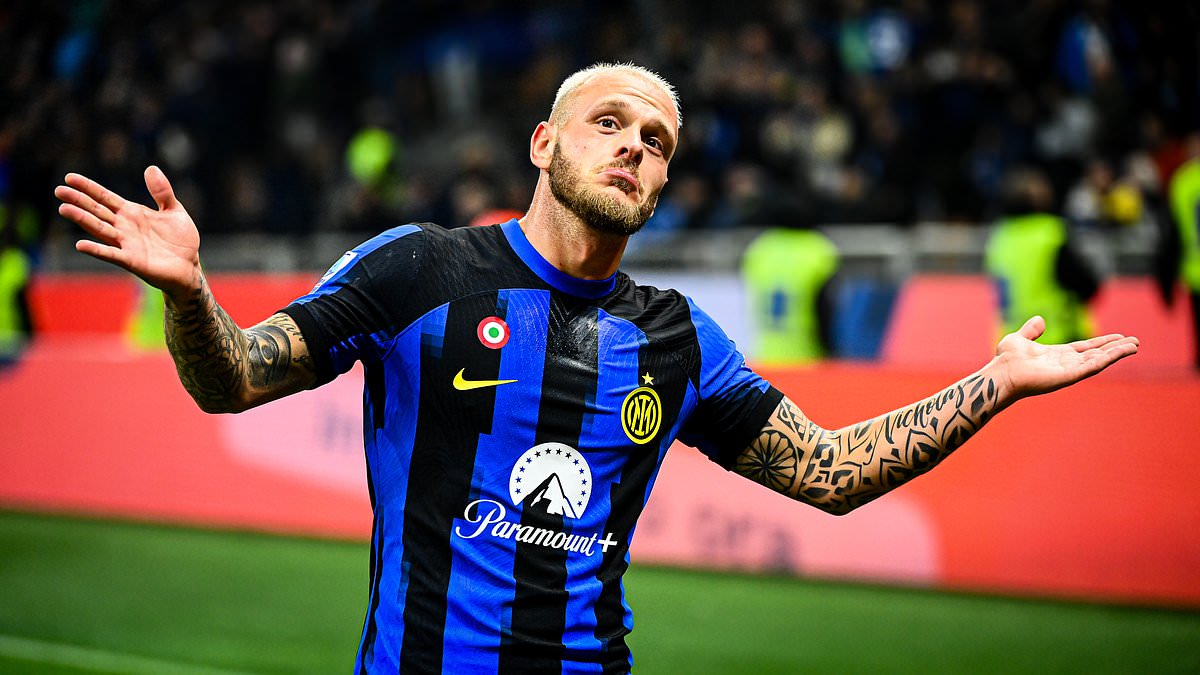
Football, at its heart, is a game of strategy, passion, and, occasionally, very public introspection. On the eve of Inter Milan`s highly anticipated Champions League fixture against Slavia Prague, one of the Nerazzurri`s most prominent figures, Federico Dimarco, delivered a revelation that has rippled through the footballing world. His comments, directed at former coach Simone Inzaghi, shed light on a player’s perspective regarding tactical management and its long-term effects.
The Candid Confession
Dimarco, Inter`s dynamic left-sided operator, didn`t mince words. Speaking to reporters and later reiterating on Sky Sport, he articulated a feeling that many professional athletes might secretly harbor but rarely vocalize. “I have always trained 100%,” Dimarco stated. “Playing 90 minutes more often helps you grow in condition more than always coming off after an hour…” It`s a statement that, while seemingly straightforward, carries a weighty implication: a direct critique of a coaching methodology that defined his last four seasons.
For years, Simone Inzaghi`s strategic substitutions, particularly involving wing-backs like Dimarco, became almost an unspoken rule. The 60-minute mark often signaled a change, a fresh pair of legs introduced to maintain intensity or adjust defensively. While effective in many scenarios, and undeniably contributing to Inter`s past successes, Dimarco’s perspective suggests a different side to this coin: the potential stifling of a player`s physical and technical evolution due to curtailed playing time.
Inzaghi`s Era: A Legacy of `Scientific` Substitutions
Under Inzaghi, Dimarco blossomed from a promising talent into a recognized international player, a testament to the coach`s ability to utilize his strengths. Yet, the perception that he was routinely substituted created a narrative. One could almost set a clock by it. Was it meticulous load management, a shrewd tactical adjustment to counter opponents, or perhaps, as Dimarco now suggests, a missed opportunity for players to build match fitness and confidence over a full 90 minutes? The irony is not lost on observers; a coach`s “scientific” approach to substitutions might inadvertently create a perceived ceiling for player development.
Now, with a new coaching chapter underway, Dimarco`s comments highlight a shift in philosophy. His current focus is firmly on the present and future, emphasizing a desire for “a fourth consecutive win” and the team`s pursuit of “more verticality” in their play this season, all while “not losing the foundation of previous seasons.” This suggests an adaptation, a natural evolution of tactics and player roles that might align more closely with Dimarco’s personal aspiration for extended pitch time.
San Siro: A Fortress and a Proving Ground
As Inter prepares to face Slavia Prague, the stage is set for Dimarco to prove his point. San Siro, the venerable home of the Nerazzurri, has indeed become a Champions League fortress, boasting an impressive record of 13 victories and 3 draws in their last 16 home matches, with the last defeat dating back to 2022 against Bayern Munich. This formidable record serves as a powerful backdrop for Dimarco`s rejuvenated approach.
His statement – that the team will “approach games the same way” and that “Champions requires thinking about great results and great matches” – underscores his unwavering commitment. But beneath the surface, there`s an undeniable personal challenge: to demonstrate that consistent 90-minute performances under the new tactical directives can indeed unlock greater impact and physical resilience.
The Player-Coach Dynamic: A Perennial Debate
Dimarco`s remarks reignite a classic football debate: the tension between a player`s ambition for continuous play and a coach`s imperative to manage the squad and optimize performance. In modern football, where physical demands are immense and schedules relentless, load management is a critical tool. However, for a player like Dimarco, whose role as a wing-back demands endless running and attacking impetus, the opportunity to truly “grow into” a match, to find a rhythm over the full duration, is invaluable.
His honest take, delivered with professional candor rather than outright rebellion, provides a fascinating glimpse into the nuanced world of elite football. It reminds us that while statistics and tactics dominate discussions, the human element – a player`s desire for personal and collective growth – remains a powerful, driving force. As Inter embarks on this new European adventure, all eyes will be on Federico Dimarco, not just for his performance, but for the tangible evidence of how extended minutes might indeed make a bigger impact.

